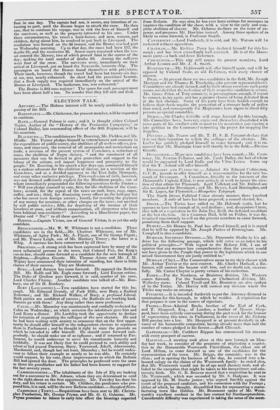THE CHOLERA.
This disease has been rather on the increase in the Country during the past week ; probably on account of the damp weather. There Ia. not the most remote chance of its ever dying out, while there is a Clerk. and a Board to record its ravages. When we say cholera has increased, we mean, of course, the diseases of various origin, symptoms, and in- tensity, that nosologists choose to include under that comprehensive. category. Of their unabated determination to class every disease affect- ing the stomach and bowels with cholera, the Greenhithe cases are the most recent instance; where the disease was as clearly traceable as perhaps any disease ever was to a well-defined cause, touching whose operation no doubt could possibly be entertained, unless by a corre- spondent or Commissioner of the Central Board.
The report of yesterday gives--New cases, 68; deaths, 24; reco- vered, 27; remaining, 293.
Among the many proofs of the non-contagiousness of the disease, ac- cident has furnished to the public very few of a more decided character than is supplied by the following narrative, which we quote from the Times of yesterday :— "The ship Brutus, of 384 tons burden, sailed on the 18th of May, from Liverpool for Quebec. She had on board 330 emigrants, men, women, and children, who with the crew made a total of 349 souls. Previous to sailing, the vessel underwent the usual examination, the crew and passengers apparently healthy. She carried an experienced surgeon, who it is said, was well supplied with medicines. On the 27th, the ninth day out from Liverpool, a healthy man, about thirty years of age, was seized with malignant cholera. The usual remedies were used, and he recovered. The next case was that of a woman, sixty. years of age, who died in ten hours after the attack. The ravages of the pestilence then rapidly increased, the deaths being numerous in, proportion to the cases. The greatest number of deaths was twenty- four in one day. The captain had not, it seems, any intention of re- turning to port, until the disease began to attack the crew. He then saw, that to continue his voyage, was to risk the lives of himself- and the survivors, as well as the property intrusted to his care. Under these circtimstances, his vessel a lazar-house, and men, women, and children, dying about him, he resolved to put back to Liverpool. The resolution was formed on the 3d instant, and the Brutus reached port on Wednesday morning. Up to that day, the cases had been 117, the deaths 81, and the recoveries 36. Seven cases remained when the ves- sel entered the Mersey, two of which proved fatal in the course of the day; making the total number of deaths 83. Among the sufferers were four -of the crew. The survivors were, immediately on their arrival at Liverpool, put on board the Newcastle, lazaretto ship. The passengers on board the Brutus found themselves with provisions. Their stock, however, though the vessel had been but twenty-six days at sea, was nearly exhausted. So short had the provisions become, that a fresh supply was required immediately on the arrival of the Brutus at Liverpool. The laudanum, too, was exhausted."
The Brutus is 383 tons register ! The 'space for each passenger must have been about half a ton. No wonder that they fell sick and died.




























 Previous page
Previous page